A beekeeper has become embroiled in a war with angry neighbours after they claimed his swarms were rendering their gardens ‘unusable’.
Complaints have been made that amateur beekeeper John Board can’t control his bees he keeps in hives at the end of his garden.
The row in a suburban street in Poole, Dorset, has come to the fore as Mr Board fights his local council to keep his aviary.
He bought a piece of vacant land behind his semi-detached house so he could triple the size of his garden and keep bees.
But his neighbours say their back gardens have become no-go areas in the summer because he is unable to control his colony of bees.
Calvin Dade, 68-year-old retired taxi driver, said his grandchildren are afraid to go in the garden due to the swarming bees.
Mr Dade, who has lived in the residential street for 38 years, said: ‘We had a swarm last summer, which lasted about three or four days where we were stuck inside and couldn’t let the grandchildren in the garden.
‘It was a whole hive full, it must have been at least a thousand.
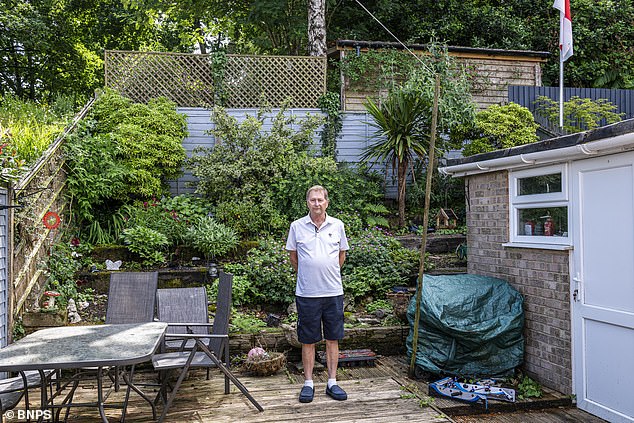
Calvin Dade, 68-year-old retired taxi driver, said his grandchildren are afraid to go in the garden due to the swarming bees
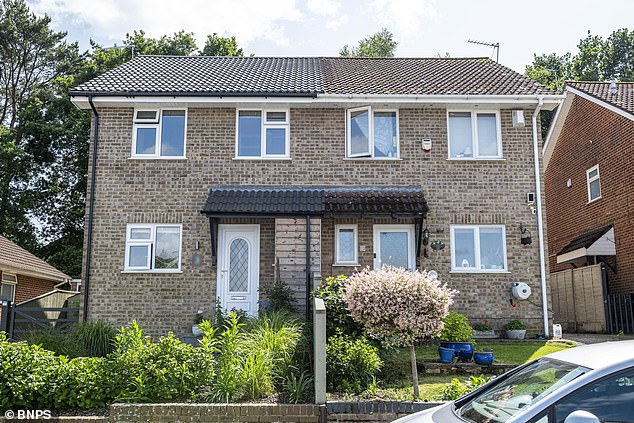
Pictured: John Board’s house (left) and Calvin Dade’s house (right)
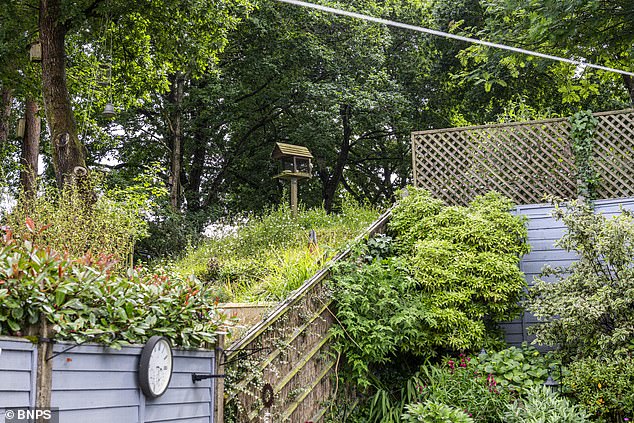
Angry neighbours are blaming an amatuer beekeeper’s ‘bad husbandry’ for making their gardens unusable due to his swarming bees
‘We had to get one of our friends who is a beekeeper to come round. She put up a temporary hive to catch them all.
‘She said that if they are properly looked after they don’t swarm.
‘When I spoke to him about it, his attitude was just ‘so, that’s having bees’. We used to get on well with them, but not since this.’
Mr Board acquired the plot, that is about a third of an acre, from Knighton Heath Golf Club in 2023.
It extended his back garden from 50ft in length to 164ft long.
He and wife Lorraine put up three sheds, as well as decking, chairs and other ‘domestic paraphernalia’.
But neighbours complained and BCP Council told the Boards they would need planning permission for a change of use to a residential garden.
This was refused as it would result in ‘unacceptable levels of overlooking’ of neighbouring homes.
So the Boards have now applied for retrospective permission to turn the land into a ‘wildflower meadow’. This would allow them to keep their apiary.
But their neighbours are objecting, citing the impact of swarming bees on the enjoyment of their own gardens.
Stuart Tizzard claimed the Boards took ‘no action whatsoever’ to deal with a swarm in June last year.
Mr Tizzard said beekeeping associations they spoke to advised that responsible beekeepers would take action to prevent a swarm, or in the event of one, and take remedial action to minimise disruption.
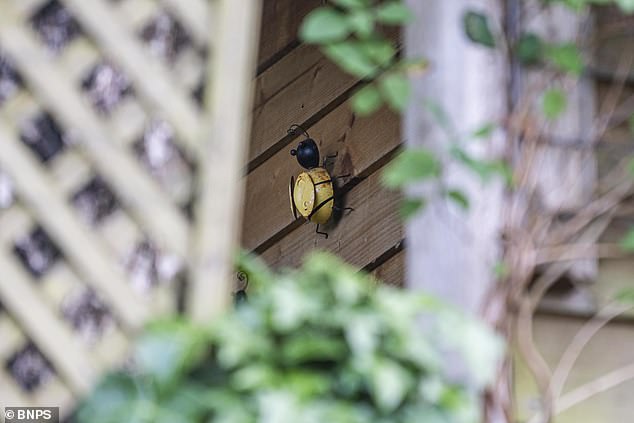
John Board bought a piece of vacant land behind his suburban house so he could triple the size of his garden and keep beehives. Pictured: : A bee decoration on John Board’s shed seen through the fence
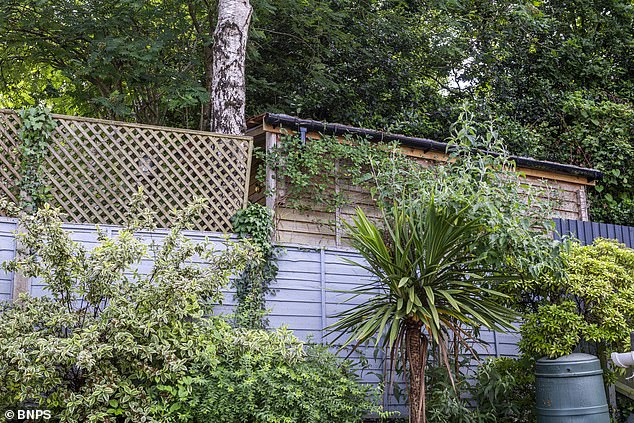
Board’s neighbours say their back gardens have become no go areas in the summer because he is unable to control his colony of bees
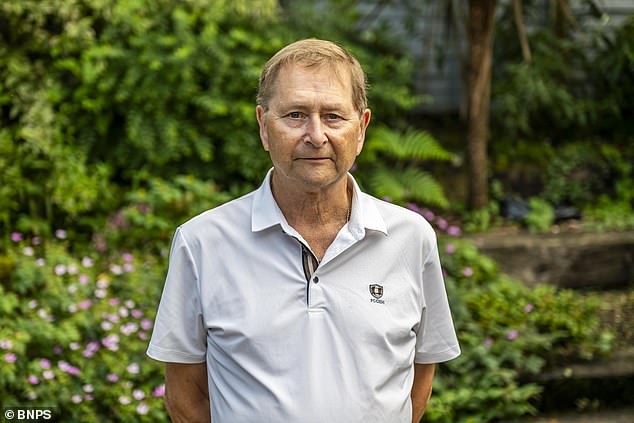
Dade, who has lived in the residential street for 38 years, said: ‘We had a swarm last summer, which lasted about three or four days where we were stuck inside and couldn’t let the grandchildren in the garden
In a letter of objection, he said: ‘Their bees swarmed and clustered in our garden, meaning we and our neighbours could not use our rear gardens for more than one week during the height of summer.
‘We had to employ a beekeeper (at cost) to relocate the bees. The situation caused disruption and risk to our children and pets.
‘In addition to swarming bees, our patio was littered with a significant number of dead and dying bees, which presented a further risk to people and pets, as well as being indicative of poor bee welfare practices.’
Barry Wicking, another neighbour, added: ‘We are all for bees and their important job to our environment, however having bee hives in a residential area surrounded by houses is ridiculous.
‘We have had to endure a huge bee swarm last year, which then prevented us from having any doors or windows open for a good week during the summer time.
‘We could not let our dog out into the garden due to the amount of them flying around or sadly the dead ones on the ground from the aftermath.
‘I understand this can happen, but responsible beekeepers would have assisted with solving the issue or even just an apology for the nightmare they caused. But nothing!
‘It has petrified my children from enjoying their garden as much as they would like to.’
He also said they have had to endure a ‘constant invasion of privacy’ due to the height of the land.
He added: ‘This makes it eye level with bedroom windows and also possible to see down into our dining area, living room and garden.’
Mr Board did not wish to comment on the matter.
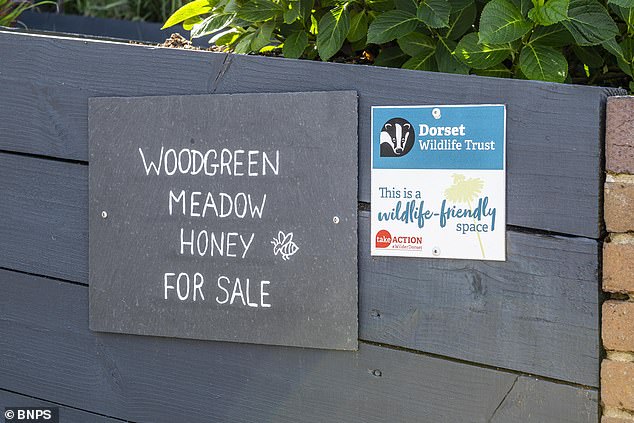
Pictured: A honey sale sign on John Board’s front wall
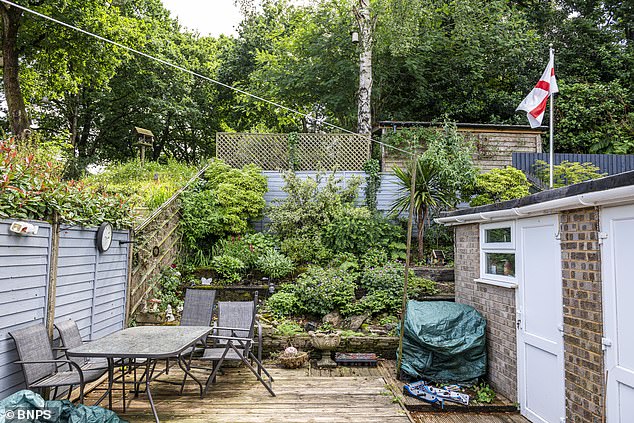
The Boards have now applied for retrospective permission to turn the land into a ‘wildflower meadow’. This would allow them to keep their apiary
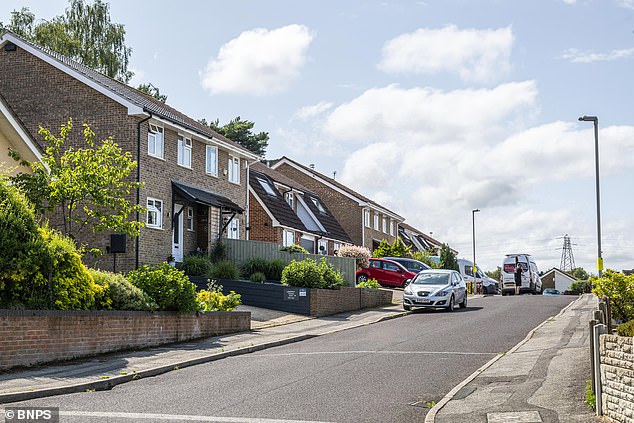
The row in a suburban street in Poole, Dorset, has come to the fore as Mr Board fights his local council to keep his aviary
But his planning agent said his hives had the backing of the Dorset Wildlife Trust which had also praised his wildflower meadow.
Jonathan Leigh, from Chapman Lily, disputed the neighbours’ objections.
He said a dedicated wildlife meadow was an appropriate setting for bee hives and the swarm last year happened when the owner was abroad and did not believe they were his bees.
He also stated swarms can happen ‘with even the most carefully managed apiaries’ and were not a sign of irresponsible beekeeping.
Mr Leigh said the Boards also proposed putting in a 6ft boundary fence to address any privacy or overlooking concerns.
Mitch Perkins, from Dorset Wildlife Trust, said: ‘I visited the wildlife-friendly space in 2023. I was looking for gardens with good examples of wildlife-friendly spaces to open to the public as part of a pilot project.
‘This area has lots of excellent habitats and provides food and water for many species. It is a very good example of how garden features can help wildlife.
‘This includes a pond, bird baths, long grass, nectar rich plants & shrubs, native wildflowers, trees plus bat and bird boxes.
‘It is a good example of a wildlife friendly space and has received one of DWT awards. It provides an important stepping stone which connects other green spaces enabling wildlife to disperse through the landscape.’











